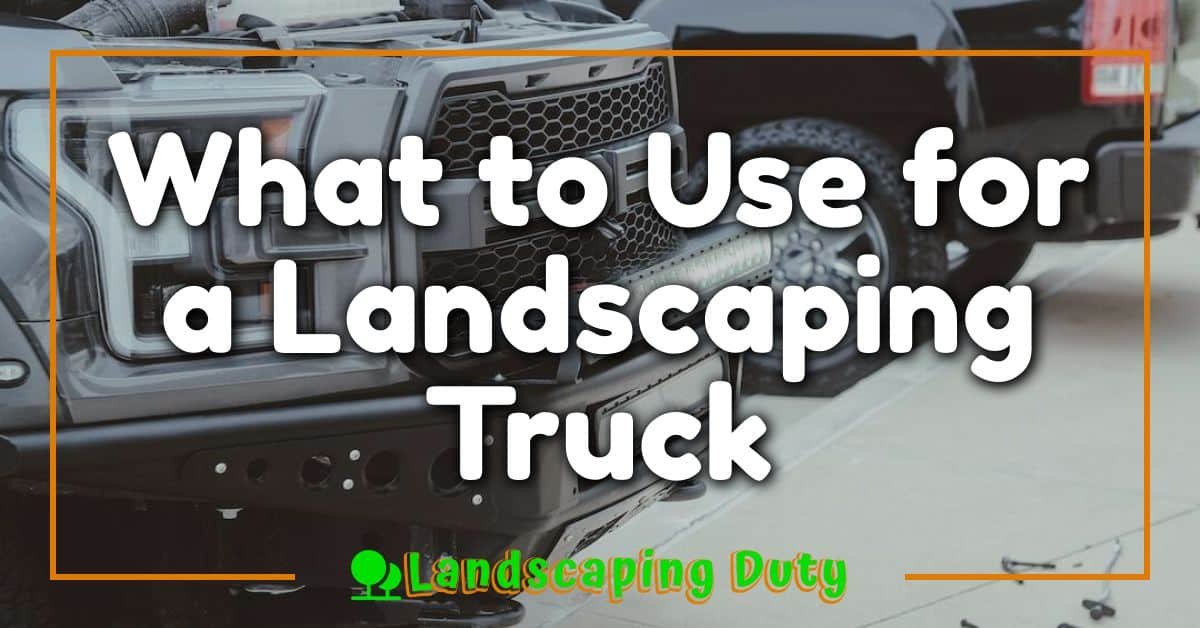Choosing the right landscaping truck is crucial for efficiently running your landscaping business. Whether you’re just starting or looking to upgrade your current vehicle, it’s important to consider various factors such as size, payload capacity, and specific features that can cater to your work needs. In this article, we’ll explore what you should look for in an ideal landscaping truck, ensuring that you make an informed decision.
Landscaping trucks come in a range of sizes and types, each designed to accommodate the unique needs of landscaping professionals. When selecting a truck, you should consider the size of your team, the tools and materials you’ll be transporting, and the type of jobs you’ll be handling. Furthermore, it’s important to factor in any custom modifications or additional equipment that you may need to install in order to optimize your truck’s efficiency.
Key Takeaways
- Choose a truck that best suits your team size, materials, and job requirements
- Consider customizing your truck for optimal efficiency and organization
- Regular maintenance and proper storage are essential for the longevity of your landscaping truck
Understanding Landscaping Trucks

As someone running a landscaping business, choosing the right truck is an important decision that can greatly impact your daily operations. In this section, we’ll discuss some essentials for a landscaping truck to help you find the best fit for your needs.
A good landscaping truck should have sufficient storage space and payload capacity to carry equipment, tools, and materials. Crew cab pickup trucks are popular choices for many landscaping companies because they provide the efficiency of transporting both the crew and equipment in one vehicle 1. When looking at trucks, consider the truck’s horsepower and dimensions for hauling, as these factors will play a role in the vehicle’s performance in a landscaping business 2.
There are different types of landscape truck bodies to choose from, such as standard and dovetail bodies. The main difference between these two options lies in the cargo bay’s containment. Pay attention to the features that will best suit your business, such as trailer plugs, brake controllers, and hitch systems for larger landscape hauls 3.
Safety is another important consideration when purchasing a landscaping truck. Overloading the truck or having an improper hitch setup can lead to accidents and compromised performance 4. To avoid such situations, make sure to select a truck and body combination that can safely accommodate your landscaping needs.
In summary, finding the right landscaping truck involves evaluating various factors, including storage capacity, truck bodies, and safety features. By considering each of these aspects, you’ll be better equipped to choose a vehicle that will efficiently support your landscaping business.
Types of Landscaping Trucks
Pickup Trucks
When you think of a landscaping truck, the first type that probably comes to mind is a pickup truck. These trucks offer a good mix of payload capacity and versatility. Popular models like the Ford F-150 or Chevy Silverado provide enough space and horsepower to handle most landscaping tasks.
Box Trucks
If your landscaping business needs more storage space for tools and equipment, you might consider a box truck. The enclosed cargo area of box trucks provides you with more room for storage and protection from weather elements. The payload is typically higher than that of pickup trucks, making it easier to transport heavy materials and equipment.
Crew Cab Pickup Trucks
For landscaping teams that require transportation for multiple workers and equipment, crew cab pickup trucks like the GMC Sierra are a great choice. Crew cab landscaper trucks offer extra seating and storage space, enabling you to transport your team and equipment efficiently. These trucks have a lower payload capacity than box trucks, but they make up for it with increased flexibility and convenience.
Diesel Engine Trucks
Choosing a landscaping truck with a diesel engine can provide you with benefits such as greater horsepower and torque. Diesel engine trucks are known for their durability and fuel efficiency, making them an ideal choice for businesses that require heavy-duty hauling capabilities. Popular diesel landscaping trucks include the Ford F-150 XL with a Power Stroke diesel engine or the Chevy Silverado with a Duramax diesel engine.
Remember, selecting the right landscaping truck for your business will depend on your specific needs and preferences. Take into consideration the payload capacity, storage space, horsepower, and required seating when making your decision.
Important Considerations when Choosing a Truck
Hauling and Towing Capacity
When selecting a landscaping truck, it’s essential to consider the truck’s hauling and towing capacity. You want a vehicle capable of carrying all your equipment, materials, and crew comfortably. Take the time to calculate your towing weight to ensure you choose the right truck for your business’s needs1.
Fuel Efficiency
Another important factor to keep in mind is fuel efficiency. Landscaping trucks traveling to multiple job sites may consume considerable fuel, so it’s best to choose a fuel-efficient vehicle for your business. This will help you save money on fuel costs in the long run. Look for trucks that have good mpg ratings.
Truck Dimensions
Truck dimensions are also vital when choosing a landscaping truck2. The size of the truck affects maneuvering in various environments and storage space for equipment. Larger trucks offer more space for equipment and crew, but smaller trucks might be easier to navigate in tight spaces. Consider the types of job sites you’ll be visiting and the equipment you’ll be using to find a truck that best fits your needs.
Truck Cost
Lastly, consider the cost of the truck you’re looking to purchase. Decide whether buying a new or used truck is right for your budget5. Buying a new truck may provide you with a longer lifespan and the latest features, while purchasing a used truck can save you money upfront. Take the time to compare the advantages and disadvantages of new and used trucks before making your decision.
Customizing Your Landscaping Truck
As a landscaping professional, investing time and effort in customizing your truck will go a long way in ensuring efficiency and productivity. In this section, we’ll discuss two essential aspects to consider when customizing your landscaping truck: tool storage solutions and rack installations.
Tool Storage Solutions
Having built-in storage in your landscaping truck is crucial for keeping your tools organized and secure. Consider an aluminum bed for your truck, which is not only lightweight but also durable. Adding a lockable toolbox within the aluminum bed provides a safe space for your expensive and essential tools.
Optimized storage space in your truck allows you to carry everything from mowers, shovels, trimmers to gas cans, resulting in fewer trips back and forth between job sites. Some options for tool storage include:
- Customized compartments for various tools
- Secure and lockable storage units
- Adjustable shelving for different tool sizes
- Heavy-duty drawers for smaller items
Rack Installations
Customized racks are an excellent addition to your landscaping truck as they help to maximize space efficiently. These racks can be easily installed on your truck bed, providing additional storage areas for your larger equipment. Here are some tips when considering rack installations:
- Choose aluminum for its lightweight and rust-resistant properties.
- Install hooks and tie-downs to secure your equipment during transport.
- Opt for adjustable brackets or mounts to accommodate various equipment sizes.
- Explore options such as ladder racks, trimmer racks, or blower racks based on your needs.
With the right customizations, your landscaping truck will serve as an efficient and reliable partner in your day-to-day operations. Remember to regularly maintain your truck and to safely store your equipment to ensure the longevity of your investment.
Landscaping Truck Maintenance
Maintaining your landscaping truck is essential to the overall success of your landscaping or snow removal business. Regular maintenance ensures that your equipment stays in good working order and helps minimize the risks of breakdowns and costly repairs. In this section, we will cover routine repairs and snow removal equipment maintenance.
« Types of Landscaping Maintenance: A Friendly Guide Types of Landscaping Equipment: Essential Tools for a Beautiful Garden »
Routine Repairs
Keeping up with routine repairs is crucial for the longevity of your landscaper truck. Here are a few essential maintenance tasks to stay on top of:
- Oil Changes: Regularly changing your truck’s oil will keep the engine running smoothly and prolong its life. Refer to your owner’s manual for the recommended oil change intervals.
- Tire Inspection: Inspect your truck’s tires for signs of wear and tear, and replace them as needed. Properly inflated tires will help improve fuel efficiency and ensure safe driving.
- Brake Checks: Regularly inspect the brake system to ensure proper functioning. Replace brake pads and rotors as needed to maintain safe stopping distances.
- Fluid Checks: Monitor all fluid levels, such as coolant, brake fluid, and transmission fluid, and refill or change as necessary to keep your truck running efficiently.
Snow Removal Equipment Maintenance
If your landscaping services include snow removal, it’s crucial to maintain the equipment specifically used for this part of your business as well. Some key maintenance tasks for snow removal equipment are:
- Detachable Snow Plow: Inspect the snow plow’s blades for signs of wear and tear, and make sure all connections are secure before use. Lubricate any moving parts and ensure the hydraulic system is functioning correctly.
- Salt Spreader: Clean the salt spreader regularly, especially after use, to prevent corrosion. Check for proper function and adjust settings as needed to ensure the spreader effectively distributes salt for deicing purposes.
- Snow Blower: Inspect the snow blower’s belts and replace them if necessary. Keep the engine well-maintained with regular oil changes and air filter replacements.
By following these maintenance tips, you’ll keep your landscaping truck and its equipment running at peak performance, allowing you to provide the best possible service to your clients. Remember, a well-maintained truck reflects positively on your business and can help increase customer satisfaction and loyalty.
Transporting and Storing Materials
Transporting Lawn Care Materials
When starting your lawn care business, it’s essential to choose the right truck and trailer for transporting various materials such as soil, compost, mulch, and plants. Consider the types and quantities of materials you’ll carry and your company’s loading or unloading methods. Knowing and following the requirements for all states in which your trucks and trailers operate is also crucial.
For efficient hauling, invest in a landscaping truck or trailer equipped with features like a robust cargo box, loading ramp, and adequate storage space. A mixed-material approach of aluminum for the doors, hood, and tailgate, along with steel for the fenders, roof, and standard cargo box, can enhance durability and ease of use.
Job Site Debris Management
Managing job site debris such as grass clippings, branches, and dirt is crucial for a well-organized lawn care business. Your landscaping truck should have enough space to accommodate debris or specialized equipment like tool storage systems for secure transportation.
Ensure that your truck has appropriate attachments for essential equipment, such as air compressors, retractable hose reels, and fire extinguishers. Keeping clipboards and documents neatly stored helps maintain organization, enabling you to focus on your tasks at the jobsite.
By following these guidelines and maintaining your landscaping truck to accommodate necessary equipment and debris, you will ensure the smooth operation of your lawn care business.
Finishing Thoughts
It’s essential to consider various factors when choosing the perfect landscaping truck for your business. Doing so can help increase your profits and improve your overall operations.
While purchasing a landscaping truck, make sure to calculate the towing weight and select a truck with the appropriate towing capacity. For example, the Ford F150 XL is an excellent choice for its bed length options, towing capacity, and payload. Keeping your fleet equipped with the right vehicles is crucial for maintaining efficiency and providing customers with the best service possible.
Another key aspect is to maintain your landscape trucks regularly. Be sure to inspect and clean them after each season, replacing any worn-out parts, such as floor mats. Keep your fleet up-to-date by adding new vehicles and retiring older, less efficient ones. This upkeep will ensure a smooth transition from winter to spring services and give your customers confidence in your professionalism.
Remember, your website is often the first impression potential customers will have of your landscaping business. Ensure you showcase your fleet on the website with high-quality images and details about the trucks’ capabilities. By doing this, you show transparency and credibility to your clients, attracting more customers to your services.
Lastly, always listen to your customers and gather feedback on your landscaping services. This information will help you adapt and grow your business, ensuring you are meeting their expectations. By maintaining a high-quality, efficient fleet, your customers will continue to trust and recommend your services, leading to a successful landscaping business.
In conclusion, selecting the right landscaping truck is a vital decision for the success of your landscaping enterprise. Keep these things in mind and continue to strive for excellence and professionalism in your services.
Frequently Asked Questions
What type of truck is best for a landscaping business?
The best type of truck for your landscaping business depends on the specific needs of your operation. For example, the Ford Super Duty is a popular choice because of its towing capacity and versatility. It’s important to consider factors such as payload, towing capacity, fuel efficiency, and comfort when selecting a truck.
Is a flatbed or enclosed truck better for landscaping?
Both flatbed and enclosed trucks have their advantages for landscaping businesses. Flatbed trucks offer easier access to tools and materials, while enclosed trucks provide better protection from the elements. It’s essential to evaluate your specific needs and preferences when deciding between the two types of trucks.
Do I need a crew cab or regular cab landscape truck?
A crew cab truck is a practical choice for many landscaping companies, as it can comfortably accommodate your entire team, making transportation more efficient. However, if you typically work with smaller crews or don’t need the extra seating, a regular cab landscape truck might be a better fit for you.
What features should I look for when choosing a landscaping truck?
When choosing a landscaping truck, consider features such as bed length, towing capacity, payload, and fuel efficiency. It’s also essential to ensure that the truck has adequate storage options for tools and equipment, as well as a comfortable cab area for you and your workers.
Are there any benefits to buying used lawn care trucks?
Buying a used lawn care truck can be a cost-effective option, particularly if you’re just starting your landscaping business or working with a limited budget. However, be sure to thoroughly inspect the truck for any potential issues and consider the costs of potential repairs.
How do I optimize my landscaping truck for efficiency and organization?
To optimize your landscaping truck, consider investing in storage solutions such as toolboxes, racks, and cabinets to keep your tools and equipment organized and easily accessible. Evaluate how you load and unload your truck to identify opportunities for increased efficiency. Additionally, performing regular maintenance will help keep your truck running smoothly and reduce potential downtime.













